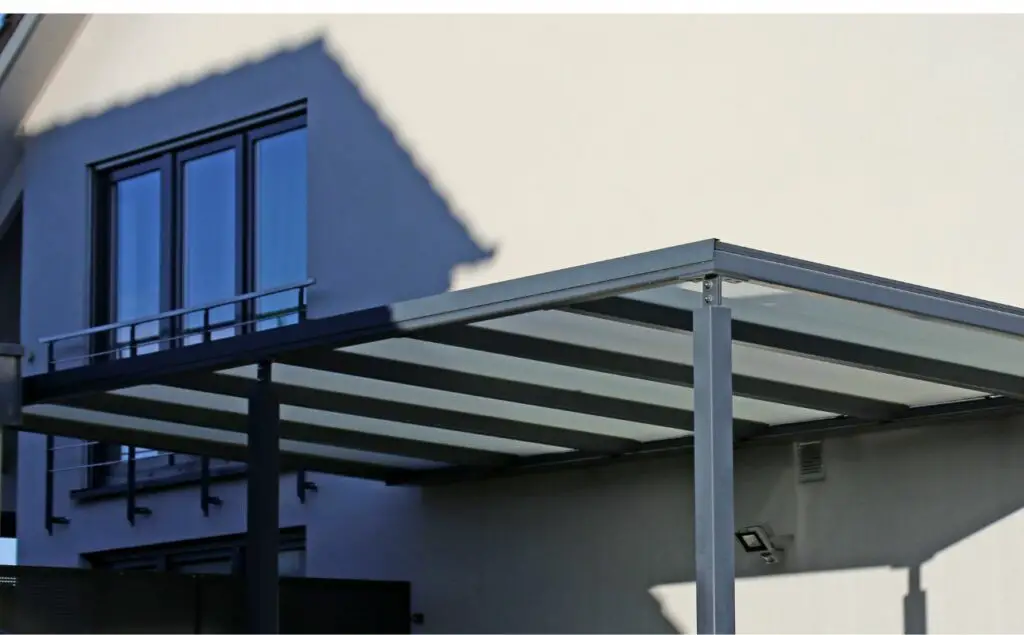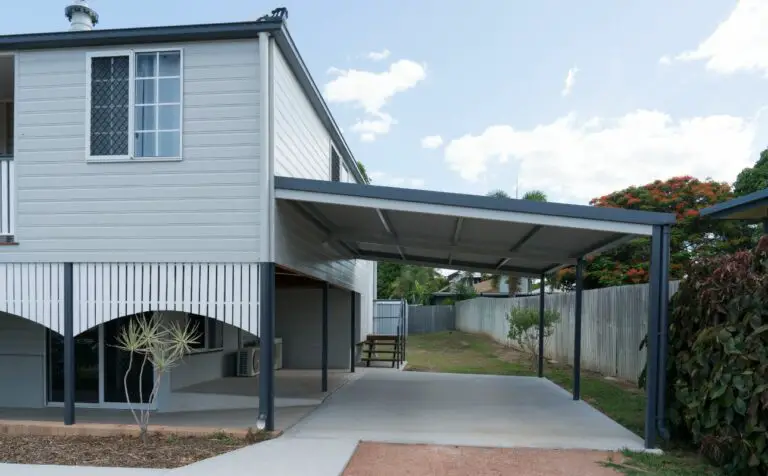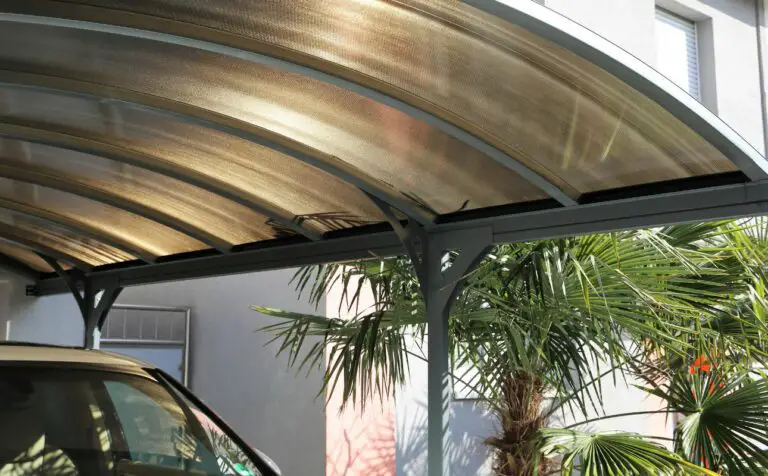Do Carports Add Value? (What You Need To Know)
Carports provide shelter for vehicles and can also serve as additional storage space. Because carports are useful and can be used for many things, they are now a common sight on both residential and business properties.
They protect vehicles from the weather and can also be used for a number of other things. But many property owners and people looking to buy a home often wonder if carports really increase the value of a property.
It’s a good question that makes you think about things like property value, curb charm, and the specific benefits that carports can bring to a property. We’ll talk about how carports can add value to a home and when they might be a good investment.

Consider the Location and Climate of Your Home
The location and climate of a home are crucial aspects to consider when evaluating the practicality and potential benefits of constructing sheltered parking spaces. The choice of carport materials should be made based on the local weather conditions, such as wind, rain, snow, or extreme heat.
Installation costs can vary depending on the terrain and accessibility of the property. Maintenance requirements should also be taken into account, especially if there are trees nearby that could drop leaves or branches onto the carport roof.
Aesthetic appeal is another factor that may influence the value added by a carport to a home’s curb appeal.
Evaluate the Quality and Design of the Carport
Like a well-crafted frame to a painting, the quality and design of a carport can enhance the aesthetic appeal and functionality of a property, potentially increasing its desirability in the eyes of prospective buyers.
Material selection plays an important role in determining both the durability and maintenance requirements of a carport. For example, metal carports are typically more durable than wooden ones, but may require more maintenance over time.
Customization options such as color schemes, roofing materials, and decorative features can further elevate the visual appeal of your carport and home. A well-designed carport that complements your home’s architecture can also increase its curb appeal and overall value.
Assess the Market Value of Your Home
Comparative Market Analysis (CMA), Appraisal Reports, and Home Inspections are three important tools that can help homeowners assess the market value of their homes.
A CMA is a report that compares recent sales of similar homes in the area to determine an estimated market value. An appraisal report is a detailed evaluation of a property’s worth by a licensed appraiser.
Comparative Market Analysis (CMA)
A comparative market analysis (CMA) is a cost-effective solution that can provide valuable insight into the benefits of carports on home values. CMAs compare similar homes in the same area that have sold recently, taking into account factors such as square footage, number of bedrooms and bathrooms, and other amenities such as garages or carports.
By comparing these homes, an appraiser can determine if there is a trend in higher values for homes with carports versus those without. This analysis can also help identify any additional features that may add value to a home beyond just the presence of a carport.
Appraisal Reports and Home Inspections
Appraisal reports and home inspections are critical steps in evaluating the true worth of a property, providing an objective assessment of its physical condition and any factors that may influence its market value.
It is important to note that maintenance plays a significant role in determining the outcome of these evaluations. A well-maintained carport can add value to a property by providing additional parking space, protection for vehicles from weather elements, and serving as multifunctional storage space.
On the other hand, if the carport is poorly maintained or does not serve any practical purpose, it may not add any value to the property. Therefore, conducting a cost-benefit analysis before adding or renovating a carport is crucial to ensure that it will have a positive impact on your property’s overall value.
Determine the Purpose of the Carport
Factors affecting carport value can include the type of material used, the size, and location. Carports made from high-quality materials such as steel or aluminum tend to add more value compared to those made from cheaper materials like wood.
Additionally, if a carport is large enough to accommodate multiple vehicles or has extra storage space, it can increase its appeal and overall value. It’s also important to consider whether the carport is meant for personal use or commercial purposes since this will influence its perceived value by potential buyers.
Consult with Professionals and Experts
To further determine the value of adding a carport, it is essential to consult with professionals and experts. This step is crucial in providing a cost benefit analysis and ROI analysis, which can guide homeowners in making informed decisions.
Experts can also provide insights into local zoning laws and regulations that must be considered when constructing a carport. Consulting with professionals can help homeowners determine the most suitable materials, design, and placement of their carport for their specific property.
Do Carports Require Maintenance?
Yes, like any other structure, carports do require some level of maintenance to ensure their longevity and to keep them in good condition. The level of maintenance depends largely on the materials used in the construction of the carport and the environmental conditions where it’s located.
For instance, metal carports, which are quite common, typically require less maintenance compared to wooden ones. However, they are not entirely maintenance-free. Metal carports may need occasional cleaning to remove dirt, bird droppings, and other debris that might accumulate over time. In coastal areas, where salt in the air can cause corrosion, it might be necessary to apply a protective coating to prevent rusting.
Wooden carports, on the other hand, may require more maintenance. They might need to be treated with a sealant or paint regularly to protect the wood from weather damage and insects. Depending on the type of wood and local climate conditions, they might also need to be checked for signs of rot or infestation periodically.
If your carport has a gutter system, these should also be cleared of leaves and debris regularly to prevent water from accumulating and causing damage. Similarly, if your carport is equipped with lighting or other electrical fixtures, these will need regular checks to ensure they’re working properly.
The Bottom Line
Adding a carport to your home can potentially increase its value depending on several factors. The location and climate of your home should be considered, as well as the quality and design of the carport. It is also important to assess the market value of your home before making any decisions.
The purpose of the carport should also be taken into account, whether it is for additional parking space or simply for aesthetic purposes. Consulting with professionals and experts can help ensure that you make an informed decision that will benefit you in the long run.
According to a survey conducted by HomeAdvisor, 70% of homeowners believe that having a garage increases their home’s value. While a carport may not provide all the benefits that come with a garage, it can still add significant value to your property.
FAQ
How much does it cost to build a carport?
The cost of constructing a carport largely depends on the materials used and whether it is constructed as a DIY project or by hiring professionals.
Typically, building a carport using wood or metal materials will range between $1,200 to $5,000 depending on the size, materials used, and complexity of the design. Using prefabricated kits or opting for simpler designs may lower costs for those looking to save money.
Can a carport be converted into a garage?
Carports tend to be less expensive than garages and require less space to construct. Converting a carport into a garage may be possible, but it will likely involve significant construction costs and may require additional permits or zoning variances.
How long do carports typically last?
Carports are typically made from materials such as steel, aluminum, or wood and their durability can vary depending on the quality of the construction.
On average, a carport can last anywhere from 10 to 20 years with proper maintenance and upkeep. Exposure to harsh weather conditions such as extreme heat or heavy snowfall can significantly reduce the lifespan of a carport.






